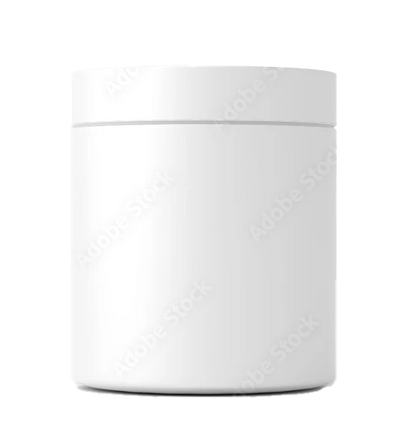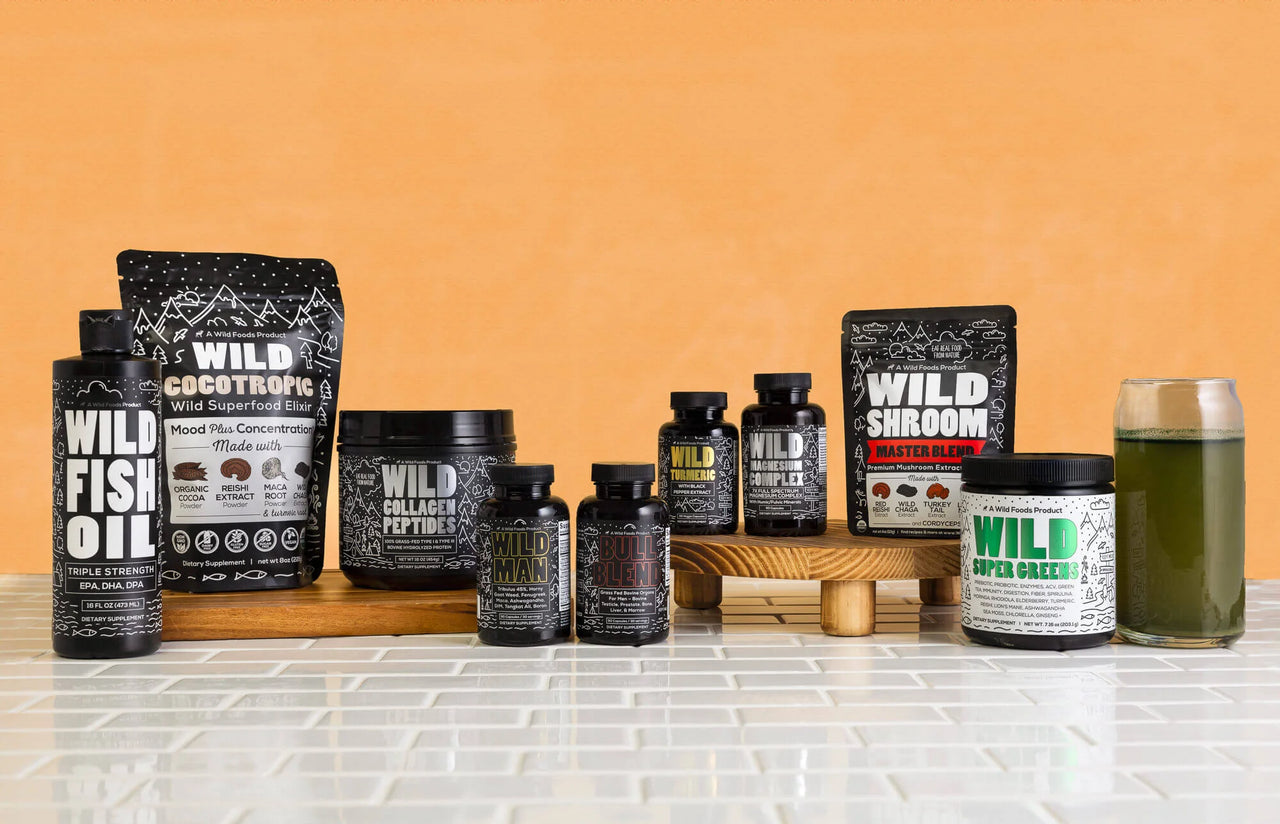Our 16oz and 32oz USDA Certified Organic Wild MCT Oils are made from 100% sustainable, organic coconuts.
Unlike coconut oil, it won't solidify at room temperature or impart a coconut flavor or texture. Our bottles are BPA-free.
Our 16oz and 32oz USDA Certified Organic Wild MCT Oils are made from 100% sustainable, organic coconuts.
Unlike coconut oil, it won't solidify at room temperature or impart a coconut flavor or texture. Our bottles are BPA-free.





Josh





Carly
"As someone obsessed with wellness, I've tried a decent amount of products. Wild Foods stands out in pretty much every category."





John
"I love pure and clean supps. That's why Wild is my go to."





Melissa
"I first tried CocoTropic around the beginning of 2020. I loved it and have been using it every morning ever since. ❤️"





Brit
"Wild Foods is in the food I cook, the beverages I mix, the supplements I take...it's just the best."





Maggie
"Wild Foods is one of those things you just get hooked on and it becomes hard to buy anything else."





Crosbi
I trust Wild for my health and my family's.





Josh





Carly
"As someone obsessed with wellness, I've tried a decent amount of products. Wild Foods stands out in pretty much every category."





John
"I love pure and clean supps. That's why Wild is my go to."





Melissa
"I first tried CocoTropic around the beginning of 2020. I loved it and have been using it every morning ever since. ❤️"





Brit
"Wild Foods is in the food I cook, the beverages I mix, the supplements I take...it's just the best."





Maggie
"Wild Foods is one of those things you just get hooked on and it becomes hard to buy anything else."





Crosbi
I trust Wild for my health and my family's.

Wild MCT Oil is extracted from one of nature's tropical miracle ingredients: coconuts.
Provides a healthy source of all-day energy. It's great for curbing the appetite as a natural way to help lose weight.
Organic, Non-GMO & gluten-free. It has a handful of uses in the kitchen to improve your health and performance.
100% highly purified pharmaceutical-grade MCT oil Blend of Caprylic (C8 at 50-60%) and Capric Fatty acids (C10 at 34-35%)




100% Yummy | 100% GMO Free | 100% Better Than The Rest


Medium-chain Triglycerides
Never ever ever evaaaa!
Sure is!
You can add it to drinks, smoothies, shakes, recipes, and even cook with it over low to medium temperatures.
Yes. This is entirely derived from coconuts.
No. Just pure MCT oil.
Short-chain fatty acids have 6 or fewer carbon atoms. Middle-chain triglycerides have 6–12 carbon atoms. MCTs are metabolized differently in the liver than LCTs. MCTs are absorbed directly from the gut to the liver, where they can be utilized for energy or transformed into ketones. As the liver breaks down lots of fat, the brain uses ketones instead of glucose or sugar.

Third-party tested.
1,000,000+ happy customers.
Health pro approved.


To help you live a better life through Real Food nutrition and obsessively sourced ingredients.
What is MCT Oil?
MCT oil is a coconut oil processed to break down into medium-chain fatty acids. These fatty acids are absorbed and metabolized differently than other fats, making MCT oil a popular choice for people looking to increase their ketone levels. Some research suggests that MCT oil can improve cognitive function and reduce inflammation.
MCT oil is pure saturated fat (the purest source of MCT), whereas coconut oil is approximately 90% saturated fat and 9% unsaturated (*). MCT oil is concentrated concentrations of MCTs from a few sources, whereas coconut oil comes from coconuts and contains a good MCT source. MCT oil is 100% MCTs, making it the most concentrated source of MCTs compared to other oils such as coconut or palm.
What’s the difference between MCT oil and coconut oil?
MCT oils and coconut oil are both edible oils derived from plants. However, MCT oils are not oils in the traditional sense at all but are, in fact, a type of fat. Coconut oil, on the other hand, is a type of vegetable oil. MCT oils are made from the fatty acids found in coconut oil. These fatty acids are known as triglycerides. Coconut oil is made mainly of lauric acid, just one triglyceride type. MCT oils are made from capric acid, caprylic acid, and other medium-chain triglycerides. Coconut oil contains roughly 62% lauric acid, a kind of MCT. Thanks to the food industry’s ability to isolate and concentrate specific fatty acids, MCT oils are nearly 100% pure caprylic and capric acids. MCT oils are essentially a concentrated form of coconut oil’s lauric acid.
How Does MCT Oil Work?
MCT oil, known as medium chain triglycerides, is derived from coconut oil. MCTs are absorbed and metabolized quickly, which makes them an excellent choice for people looking to lose weight or improve their overall health. MCTs comprise two types of fatty acids - short and medium chain, which allow them to be quickly digested and sent into the bloodstream, where they are used as energy.
MCTs are a great way to lose weight because they help burn more calories. In addition, MCTs can improve your overall health by helping you lose weight and reduce your risk of heart disease, stroke, and type 2 diabetes.
MCT products are refined extractions of coconut oil, which assures that they contain higher concentrations of various MCTs (such as C8 and C10) than coconut oil. Fatty acids MCT and lauric acid behave slightly differently in the body.
However, in the United States, it is legal for coconut and MCT oil manufacturers to state that lauric acid is a form of MCT. Most MCT oils contain less lauric acid than coconut oil, and they concentrate these smaller amounts of MCTs in a way that is as simple as possible for our bodies to use as energy--and less likely to store as body fat.
MCT oil contains medium chain fatty acids by its very name, but coconut oil is also one of the best sources of MCTs available in the diet.
Because of this quick digestion, MCT oil is less likely to get stored as body fat, so according to the U.S. National Library of Medicine, it is better at helping you lose weight than other fatty acids. MCT oil is best for weight loss and energy since it is a concentrated source of unique fats (C8 and C10) that increase ketones, give cells instant power, and resist being stored in fat cells. The benefits of both MCTs and coconut oil are varied, ranging from increased ketone production to reduced body fat and improved mental clarity.
Generally, the MCTs found in MCT oil bypass the normal digestion of fats and go directly into the liver, where the body rapidly metabolizes them and converts them to energy, providing increased energy levels and fat-burning properties while supporting ketone body production, making it a popular choice among those following a keto diet. Between 62% to 65% of coconut oil saturated fat comes from MCTs (medium-chain triglycerides), a type of saturated fat that is absorbed and used differently by our bodies compared to most fats, such as LCTs (long-chain triglycerides), which makes up the remaining saturated fats in coconut oil.
How are MCT oils made?
MCT oils are made from coconut and palm kernel oils by subjecting them to various chemical and mechanical processes that extract them from their source materials. First, the coconuts and palm kernels are dried and then ground into a fine powder.
The powder is then mixed with ethylene and carbon dioxide to create a reaction that extracts the oil from the powdered material. The extracted oils are then refined to remove impurities such as traces of water, solids, and other chemicals. The result is an oil that is nearly 100% pure caprylic and capric acids.
What are the Benefits of MCT?
MCT is An Excellent Source of Energy: Unlike the other fatty acids in coconut oil, your liver does not metabolize MCT oils. Instead, they are processed by the digestive tract and delivered to the liver via the portal vein. In the liver, MCTs are burned as fuel, providing an excellent energy source. Since MCTs do not go through the liver, they are not metabolized as fat.
Easy to Digest: MCT oils are very easy to digest, making them very friendly to people experiencing gastrointestinal issues. Because the liver, like other fatty acids, does not metabolize MCT oils, even people with conditions such as irritable bowel syndrome and other forms of gastrointestinal distress can benefit from MCT oils.
May Promote Weight Loss: MCTs are metabolized as energy in the liver and are efficiently converted into fuel. Since they are not stored as fat, eating MCTs can promote weight loss because they are less likely to be stored as body fat than other fats.
What Foods Can I Cook with MCT Oil?
MCT oil can be used instead of other oils in various recipes, from salad dressings to cookies, and it has several health benefits.
Here are four foods you can cook with MCT oil:
1. Salads and vegetables: MCT oil can be used as a replacement for olive or other oils in salads and vegetables. It provides a healthy dose of antioxidants, which helps to prevent damage to cells and promotes healthy skin and hair.
2. Pancakes and waffles: MCT oil can be used as an ingredient in pancake and waffle mixes and as a standalone option when making pancakes or waffles from scratch. It adds richness and flavor to the batter while helping to keep them light and fluffy.
3. Homemade dessert: MCT oil can be used as an ingredient in brownies, cakes, pies, cookies, ice cream, smoothies
4. General purpose medium heat cooking: You can cook with MCT on medium and low heat!2.